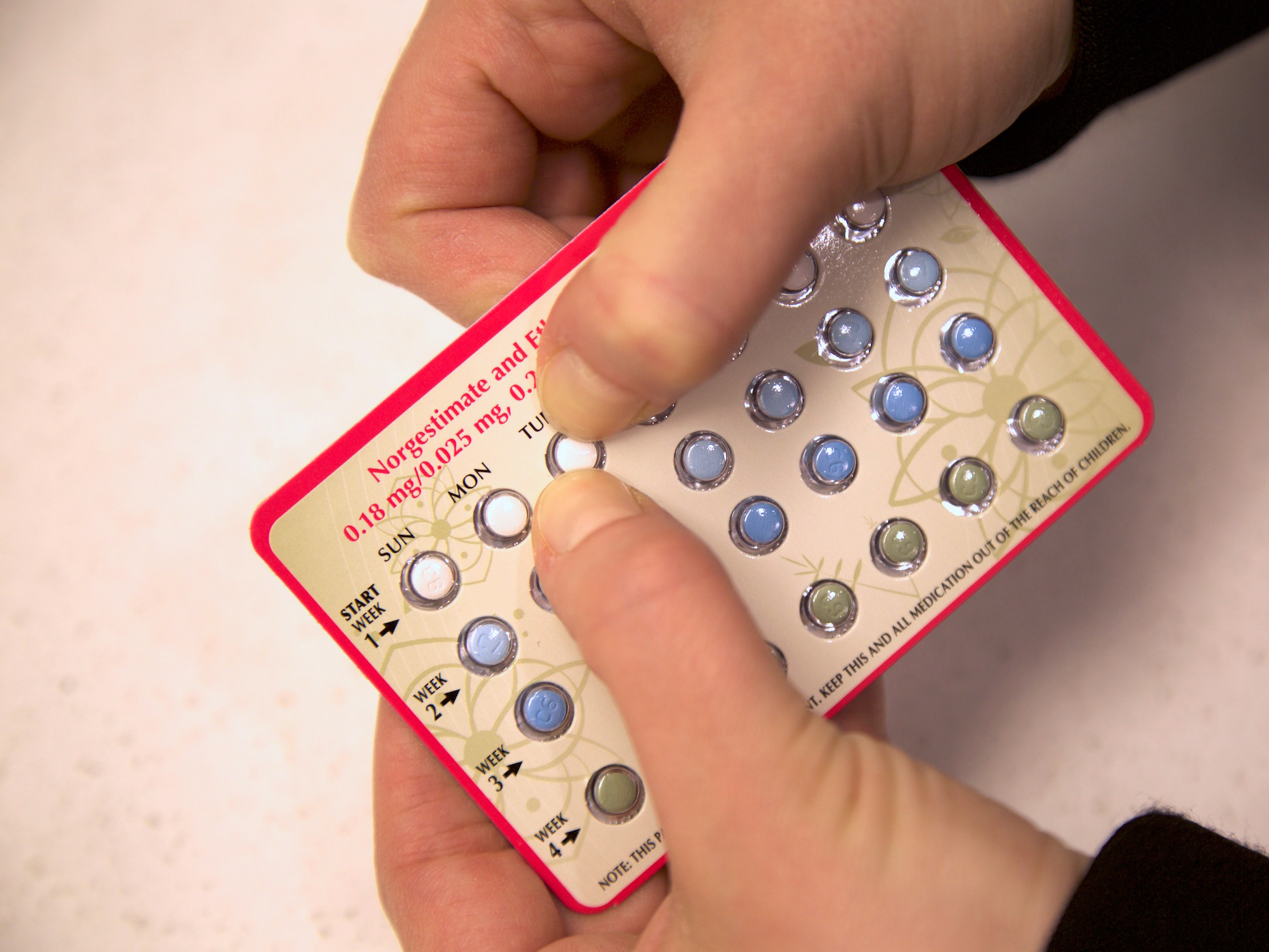- Most of us have probably heard that the birth control pill can make us less interested in sex. Research suggests the pill may also make men less interested in sex with you.
- The periovulatory phase of your cycle (that window of time prior to ovulation when estrogen is dominant across a woman’s menstrual cycle) is generally a time when women look and feel their sexiest.
- Men have evolved brains that find women’s faces, voices, and body scents most attractive at this time.
- The pill lowers estrogen levels though, so it may make you lose a little bit of your sexiness edge and decrease the likelihood of being approached by males for sex.
- Visit Insider’s homepage for more.
The following is an excerpt from This Is Your Brain on Birth Control: The Surprising Science of Women, Hormones, and the Law of Unintended Consequences by Sarah E. Hill PhD.
Although most of us have probably heard that the pill can make us less interested in sex, research suggests that the impact of the pill on sexual desire might cut both ways, potentially making men less interested in sex with you. Which is so not okay.
Here’s the breakdown. First, research finds that the periovulatory phase of your cycle (that window of time prior to ovulation when estrogen is dominant across a woman’s menstrual cycle) is generally a time when women look and feel their sexiest. This is when women are fertile and able to conceive from sex. And as a result of this, men have evolved brains that find women’s faces, voices, and body scents most attractive at this time. And for their part, women dress sexier and act more flirtatious at this time, too. This is because the periovulatory estrogen surge tells women’s bodies to pull out all the stops to make them the sexiest, most alluring version of themselves that they can possibly be.
Those eggs aren’t going to fertilize themselves, you know.
And since pill-taking women don't ovulate, this means that they miss out on this all-natural, free-of-cost, (certified fair trade and organic) mid-cycle sexiness boost. Although this might not be a big deal for everyone, it might be for you. Most of us want all of the sexiness boosts we can get. And pill-taking women don't get this monthly sexiness spike from their sex hormones.
The pill could subconsciously signal you're a 'reproductive dead-end' to potential love interests

So, the pill might make you lose a little bit of your sexiness edge across the cycle because you miss out on your estrogen surge. How all of this plays out in men's and women's sexual dynamics can be difficult to study, though, because it's difficult to observe human sexual behavior in the wild, so to speak. Thankfully, someone was clever enough to realize that this is the sort of research question that you can study in non-human primates (other species of non-us apes and monkeys), who use the same birth control pills that we give humans. That's right: monkeys go on the pill.
In addition to preventing unintended pregnancies in populations of primates living in captivity (which is why they're given the pill in the first place), giving primates the pill also sets the stage for some interesting research into how male primates respond to female primates, sexually, when the females are on the pill. Obviously, this isn't going to be a perfect analog to what goes on in humans, but we can learn a few things about how men might respond to women based on their pill-taking status from observing the sexual immodesties of our closest living relatives.
The results of this research shows pretty unanimously that being on the pill decreases females' likelihood of being chosen as a mate. For example, in female chimpanzees and rhesus macaques, being on the pill is found to decrease the likelihood of being approached by males for sex, and also decreases the number of spontaneous mounting attempts they receive. Although you and I might find the latter to be a terrible breach in dating etiquette (particularly when done without warning or introduction), this is a huge compliment to females in these species, for whom a mounting attempt is high romance. An even more egregious reduction in sexual interest is observed in the male cynomolgus monkey (Macaca fascicularis). Although these males are equally likely to have sex with naturally cycling and pill-taking females, when they have sex with the pill-takers, they don't ejaculate. They can't be bothered.
It's almost as if they have some level of awareness of the pill-taking female is a reproductive dead-end and would rather save the energy that would be required to punctuate their sexual behavior with gamete release to do something else. Like, going to look for a snack, or trying to attract a partner who might eventually ovulate. Interestingly, research in humans that suggests that human males (those slightly less hairy apes that we call men) might also change their partner-related behaviors depending on the reproductive dead-end status of their mates. Consider one study that was done on a sample of newlywed couples to look at the connection between women's level of commitment to their partners and the mate-guarding behaviors of men. Mate guarding is a term that's used to describe the whole smorgasbord of activities that people in relationships might do to keep their partner from straying. For example, when your partner texts you to ask who you're out with, that's mate guarding. Mate guarding is also the thing that's happening when you find yourself grabbing your boyfriend's hand whenever there are attractive, non-you women around. We mate guard to help keep our romantic relationships intact in a world full of sexual opportunities and mate poachers.
Men who date women on the pill might act less jealous

Now, normally, there is a relationship between low commitment in one partner and increased mate guarding in the other. This makes good sense. Uncommitted partners are more likely to stray than committed partners, making it a good idea to up your mate guarding game when your partner seems less committed to the relationship. So, neither one of us should be terribly surprised that this was the exact pattern that was observed among many of the newlywed couples in this study. Low commitment on the part of wives predicted increased mate guarding by their husbands.
That is, unless the men were married to a woman on the pill.
For men married to women on the pill - although there was an uptick in jealousy that occurred in response to their partner's low commitment (which was also observed in the other couples, too, as you might expect) - there was no increase in mate guarding behaviors. So, even though these men felt more jealous than men with more committed partners, they took fewer actions to do anything to keep their partner away from other men. It's like they just can't be bothered if the integrity of their partner's empty womb isn't at stake. Just like the non-ejaculating cynologus monkeys, men seem to change their behavior toward their partners when conception isn't possible. They might decrease mate-guarding behaviors in response to the diminished risk of their partner becoming pregnant with some other man's child. Although this might be good in some ways (it frees you up from having to worry about an overbearing partner…which is a context that can be linked to violence and abuse), it may be bad in others. Mate guarding can prompt greats acts of romance targeted at keeping women happy and satisfied.
Read more: 10 things you should know before switching birth control
So, the pill may put you at a sexiness disadvantage by suppressing a naturally-occurring boost in attractiveness that accompanies the periovulatory estrogen surge. This little boost in sexiness may be the thing that helps you catch the eye of an attractive stranger who will whisk you away to Paris for the most amazing weekend of your life.
Alternatively, this might be something that you wish to avoid because you have more important things to worry about and don't want to be bothered by unwanted advances, mate guarding attempts, or (if we are to take the chimpanzee research seriously) spontaneous mounting attempts. It's also possible that having or eliminating a cycle-based beauty boost might not impact you in any meaningful way at all. Regardless of what this might mean for you, this is information that's worth knowing when it comes to the pill. You can use it to help make you the version of yourself that you most want to be.
Reprinted from This Is Your Brain on Birth Control: The Surprising Science of Women, Hormones, and the Law of Unintended Consequences by arrangement with Avery, an imprint of Penguin Publishing Group, a division of Penguin Random House LLC. Copyright © 2019, Sarah E. Hill, PhD.

